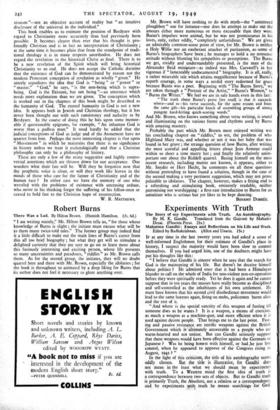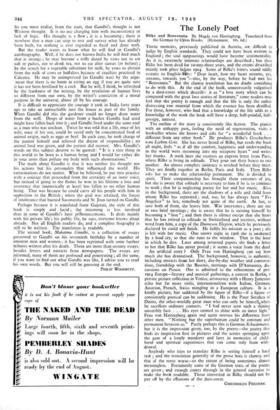Experiments With Truth
IF at any time in the last twenty years you had asked a score of well-informed Englishmen for their estimate of Gandhi's place in history, I suspect the majority would have been slow to commit themselves. If you had urged him, one of the doubters might have put his thoughts like this:
" I believe that Gandhi is sincere when he says that the search for God is the mainspring of his life. But doesn't he deceive himself about politics ? He admitted once that it had been a Himalayan blunder to call on the whole of India for non-violent non-co-operation before they were spiritually ready. Yet he does it again and he cannot suppose that in ten years the masses have really become as disciplined and self-controlled as the inhabitants of his own settlement. He must have known that his second civil disobedience movement would lead to the same horrors again, firing on mobs, policemen burnt alive and the rest of it.
"And where is the special sanctity of this weapon of fasting till someone does as he wants ? It is a weapon, a means of coercion, as much a weapon as a machine-gun, and more efficient when it is used against decent people. That brings me to the last point. Fast- ing and passive resistance are terrific weapons against the British Government which is ultimately answerable to a people who are warm-hearted and not unjust. But can Gandhi seriously suppose that these weapons would have been effective against the Germans or Japanese ? Was he being honest with himself, or had ,he just lost control, when he appeared to approve of the Congress rising in August, 1942 ? " In the light of this criticism, the title of his autobiography seem' oddly chosen. But the title is illustrative, for Gandhi doe- not mean in the least what we should mean by experiment; with truth. To a Western mind the first idea of truth 1, a correspondence between two sets of objects. But to Gandhi truth is primarily Truth, the Absolute, not a relation or a correspondence, and by experiments with truth he means searchings for God.
So you must realise, from the start, that Gandhi's thought is not Western thought. It is no use charging him with inconsistency or
lack of logic. His thought is a flow ; it is a becoming; is nowhere that a man can stop to rest and survey what has already been built, for nothing is ever regarded as fixed and done with.
But the reader wants to know what he will find in Gandhi's autobiography. Well, if he does not known India he will find much that is strange ; he may become a trifle dazed by vows not to cat salt or pulses, not to drink tea, not to eat after sunset (or before) ; by the search for a vegetable substitute for milk, by vows to abstain from the milk of cows or buffaloes because of cruelties practised in Calcutta. He may be unimpressed (as Gandhi was) by the argu- ment that there is no harm in eating an egg if you are quite sure it has not been fertilised by a cock But he will, I think, be refreshed by the frankness of the writing, by the revelation of human lives so different from our own, by the writer's conviction of a moral purpose in the universe, above all by his courage.
It is difficult to appreciate the courage it took in India forty years ago to take an untouchable into the house as part of the family. When Gandhi did this the gardener could no longer draw water from the well. Drops of water from a bucket Gandhi had used might have fallen back into it ; and Gandhi lived under the same roof as a man who was unclean. Twice he was told that a life, once of his wife, once of his son, could be saved only by concentrated food of animal origin, such as eggs or beef. In each case, he took charge of the patient himself and relieved the doctor of responsibility ; no animal food was given, and the patient did recover. Mrs. Gandhi's words on this subject deserve to be quoted: " It is a rare thing in this world to be born as a human being and I would far rather die in your arms than pollute my body with such abominations."
The truth about Gandhi is that it was neither his thought nor his actions but his personality 'that influenced the world. His ratiocinations do not matter. What he believed, he put into practice with a courage that proceeded from the certainty of an inner voice, but instead of going to the flames he won in his lifetime a love and reverence that (numerically at least) has fallen to no other human being. That was because he could carry all his people with him in opposition to the British ; when the goal was attained, the forces of intolerance that burned Savonarola and St. Joan turned on Gandhi.
Perhaps because it is translated from Gujerati, the style of this book is simple and lucid ; the reasoning is less involved than in some of Gandhi's later prrtnouncements. It deals mainly with his private life.; his public life, he says, everyone knows about already. Not all English readers do, and a complete biography is still to be written. The translation is readable.
The second book, Mahatma Gandhi, is a collection of essays presented to Gandhi on his seventieth birthday by a number of eminent men and women ; it has been reprinted with some further tributes written after his death. There are more than seventy essays. besides letters and extracts from newspapers. The essays are informed, many of them are profound and penetrating ; all the same, if you want to find out what Gandhi was like, I advise, you to read his own words. But you will still be guessing at the end.
PHILIP WOODRUFF.



































 Previous page
Previous page